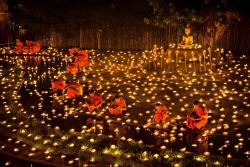Difference between revisions of "Insentient beings"
Jump to navigation
Jump to search
| Line 4: | Line 4: | ||
[非情] (Jpn hijo) | [非情] (Jpn hijo) | ||
| − | Those beings or objects that have no [[emotions]] or [[consciousness]] , such as [[trees]] and stones. The term is contrasted with [[sentient beings]] , those forms of [[life]] that possess [[senses]] , [[emotions]] , or [[consciousness]] . [[Buddhism]] classifies all existences into two categories: sentient and insentient. A dispute arose in [[Chinese Buddhism]] with regard to whether insentient beings possess a [[Buddha nature]] , but the view that [[Buddhahood]] exists as a potential in all things and [[phenomena]] prevailed in [[China]] . This idea also became widespread in [[Japan]] . See also [[enlightenment | + | Those beings or objects that have no [[emotions]] or [[consciousness]] , such as [[trees]] and stones. The term is contrasted with [[sentient beings]] , those forms of [[life]] that possess [[senses]] , [[emotions]] , or [[consciousness]] . [[Buddhism]] classifies all existences into two categories: sentient and insentient. A dispute arose in [[Chinese Buddhism]] with regard to whether insentient beings possess a [[Buddha nature]] , but the view that [[Buddhahood]] exists as a potential in all things and [[phenomena]] prevailed in [[China]] . This idea also became widespread in [[Japan]] . See also [[enlightenment of plants]]. |
{{R}} | {{R}} | ||
Revision as of 17:15, 21 July 2013
insentient beings
[非情] (Jpn hijo)
Those beings or objects that have no emotions or consciousness , such as trees and stones. The term is contrasted with sentient beings , those forms of life that possess senses , emotions , or consciousness . Buddhism classifies all existences into two categories: sentient and insentient. A dispute arose in Chinese Buddhism with regard to whether insentient beings possess a Buddha nature , but the view that Buddhahood exists as a potential in all things and phenomena prevailed in China . This idea also became widespread in Japan . See also enlightenment of plants.
